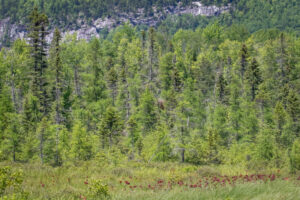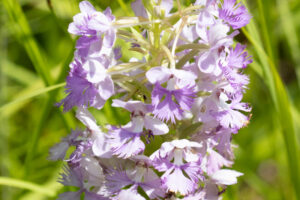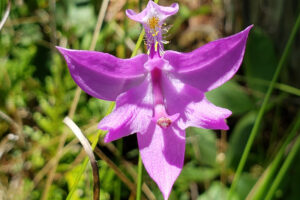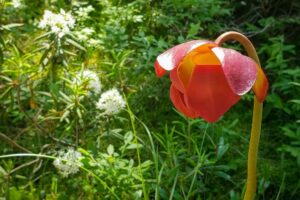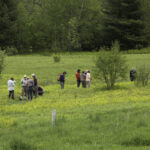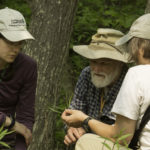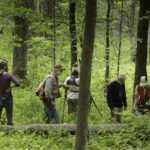Peatlands Rich and Poor: Ecology, Indicators, Patterns

Instructors: Brett Engstrom & Jerry Jenkins
July 20 - 21, 2024 | $285
Course size: 12 students
Financial support available (contact us)
A Northern Forest Atlas field course
P
eatlands have held a peculiar fascination for humans probably for as long as we, as a species, have encountered them. There exists a mix of awe with a trace of fear perhaps, especially for bogs with treacherous footing, stunted trees, and a moss-muffled atmosphere.
In this field course, we will examine two different flavors of peatlands: one day at an acid bog and the second day at a “rich” or mineral-enhanced fen or swamp. The bulk of our time will be spent exploring, drawing, and mapping the plumbing (hydrology), vegetation patterns, plant forms, and whatever else speaks of the peatland. We will use different Northern Forest Atlas photographic guides to identify prominent species of woody plants, mosses, sedges, and grasses which help indicate the type of peatland.
The field experiential portion of this two-day course is not only the bulk of the course, it is critical for gaining an understanding and appreciation for peatlands. We will meet at NBNC each day and preview species and ecology of peatlands, then head out to a vicinity peatland for the rest of the day. While our days will involve relatively short, flat-ground hikes (one mile or less roundtrip each day), they will be full days outside with bugs, heat, and possible rain. Consider it all part of the course.
“When, formerly, I have analyzed my partiality for some farm which I had contemplated purchasing, I have frequently found that I was attracted solely by a few square rods of impermeable and unfathomable bog, - a natural sink in one corner of it. That is the jewel which dazzled me.” Henry David Thoreau, Walking
About the Instructor(s)
Jerry Jenkins, from White Creek, New York, was trained in philosophy and mathematics, and has done botanical work 55 years. He has free-lanced in botany and ecology, worked as a researcher for the Wildlife Conservation Society, and currently produces books and imagery for the Northern Forest Atlas Project. He has written books on Vermont geography, acid rain, climate change, conservation easements, Adirondack geography, and four photographic guides (Woody Plants, Sedges, Mosses, and Grasses) and accompanying digital atlases for the Atlas Project. We will use the guides and digital atlas in the course. He is currently working on a full-length field guide to woody plants and a book on ecological patterns.
Brett Engstrom is a field naturalist living on Drew Mountain at the northern end of the Granite Hills of Vermont. For over 30 years he has worked, and continues to work, as a freelance botanist & ecologist throughout New England and upstate New York. The bulk of his work centers on ecological inventories and natural community mapping for public agencies, conservation organizations, and private individuals and businesses. He has assisted Jerry in work on the Northern Forest Atlas Project’s Woody Plants and Sedges, and is co-author with Jerry for the Grasses of the Northern Forest.
Physical Requirements
Participants must be able to walk up to 2 miles over the course of each day off trail over uneven and potentially muddy terrain. Participants should be comfortable outside in potentially hot, muggy, wet, and/or buggy conditions for long periods of time. Participants must be comfortable climbing over, under, and through debris in the forest. Please reach out to us if you have any questions about mobility and/or other accessibility needs.
Recommended Reading
Meals
We will provide coffee, tea, and light breakfast fare (pastries, etc.) at NBNC. Participants should bring their own lunches and snacks.
Timing
Course begins 9 AM on Saturday at North Branch Nature Center. Course begins on Sunday at a time of the instructors' choosing. Course concludes by 5 PM on Sunday.
Academic Credit / Professional Development
This course may qualify for 1 graduate-level credits for an additional $200 course fee. All BioU courses are accredited by Castleton University. Participants interested in receiving credit must contact us at least 2 months in advance so we have time to arrange course accreditation.
It is the student’s responsibility to ensure that home institutions will accept the credit. Participants pursuing academic credit will be required to complete an additional assignment above and beyond the course hours, including literature review, reflective writing, or a field-based project.
This course qualifies for 20 hours of professional development hours and continuing education units. Certificates of completion are provided at the conclusion of the course.
Cancellation Policy
While we realize that unexpected circumstances arise that are out of our control, North Branch Nature Center cannot guarantee refunds for registrations cancelled within 30 days of the course. If a cancellation occurs within this window, NBNC will attempt to fill the space from our wait list and provide a full refund. If the course needs to be cancelled by NBNC, we will provide a full refund.
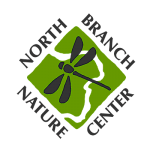
713 Elm Street
Montpelier, Vermont 05602
(802) 229-6206
Hours: Center Open Monday-Friday 9-4
Trails Open 24/7
